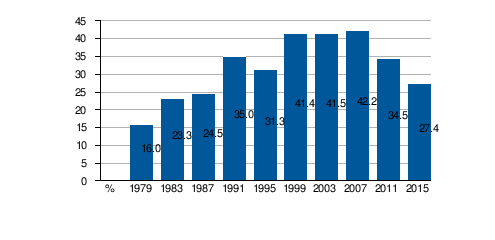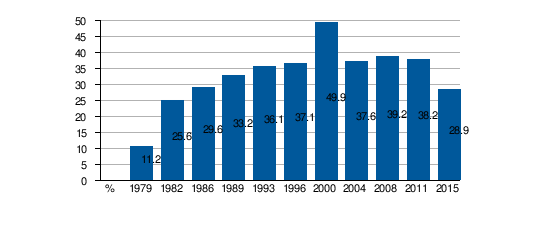Navarrese People's Union
Navarrese People's Union Unión del Pueblo Navarro | |
|---|---|
 | |
| Leader | Javier Esparza |
| Founded | 1979 |
| Headquarters | Pamplona |
| Youth wing | Navarrese Youth |
| Ideology |
Navarrese regionalism Conservatism Spanish unionism Opposition to Basque nationalism[1][2] |
| Political position | Centre-right to Right-wing |
| Colours | Blue, red, white |
| Congress of Deputies |
2 / 5 Navarrese seats |
| Spanish Senate |
2 / 5 Navarrese seats |
| Parliament of Navarre |
15 / 50 |
| Town councillors |
281 / 1,889 |
| Website | |
| www.upn.org | |
The Navarrese People's Union (Spanish: Unión del Pueblo Navarro), abbreviated to UPN, is a regional conservative political party in Navarre, Spain. Until 2008, it was a fraternal party of the People's Party (PP), acting as the latter's Navarrese branch.
UPN is a strong opponent of Basque nationalism, and supports a Spanish regional identity for Navarre with a marginal Basque component and separate from the Basque Country. The party's regionalist tradition dates back to the nineteenth century, in which the Spanish nation is seen to be based on 'regional liberties'.[3]
During the 1991–2008 period, UPN acted as the Navarrese branch of the PP, which, in return, did not run at Navarrese elections as a part of their agreement. During this period, UPN was the largest party in elections for the regional Parliament of Navarre[4] and the ruling party of the Autonomous Community since 1996.
History
The UPN was a Navarrese splinter group of the Union of the Democratic Centre. Its president, Miguel Sanz, has been the head of the Navarrese government since 1996.
Juan Cruz Alli was elected president of the Navarrese government for UPN, but later disagreed with the orientation the party was taking and founded another party Democrats' Convergence of Navarre.
Pacts with the PP
As part of an agreement held over the 1991–2008 period, the PP did not run in any elections in the Navarra Congress Electoral District and People's Party of Navarre (founded in 1989) was dissolved, while UPN were on the same national ticket as the PP at the Spanish national elections. The national Deputies and Senators elected as part of UPN's ticket were part of the PP Parliamentary Group. Also, UPN members were eligible –and indeed chosen– for national leadership positions in the PP.
The pact was terminated in October 2008 as a result of UPN refusal to vote alongside the PP in the Spanish Congress of Deputies to reject the government budget presented by José Luis Rodríguez Zapatero's cabinet. One of the two MPs elected under the UPN-PP ticket refused to follow UPN's instructions and a number of UPN elected representatives defected this party to join the PP.[5][6][7] The new situation led to the PP setting up its own office in Navarre.[8]
The two parties ran separate lists in the 2011 regional elections in Navarre with the UPN receiving 34.5% against the 7.3% that the PP received. On 8 September 2011, the two parties reached an agreement to renew their alliance for the 2011 Spanish general election.[9] Under the agreement, the UPN would take the first and third places on the list for Congress while the PP would have the second. For the Senate, the UPN would have the top two places on the list, with the PP taking the third place. A major factor in the new agreement was the two parties desire to prevent Bildu from winning enough seats to form a parliamentary group.[9]
Election results
Parliament of Navarre

| Election | Seats | +/− | Votes | % | Outcome | Leader |
|---|---|---|---|---|---|---|
| 1979 | 13 / 70 |
40,764 | 16.0 (#3) | First Opposition | Jesús Aizpún | |
| 1983 | 13 / 50 |
±0 | 62,072 | 23.3 (#2) | First Opposition | Balbino Bados |
| 1987 | 14 / 50 |
|
69,419 | 24.5 (#2) | First Opposition | Juan Cruz Alli |
| 1991 | 20 / 50 |
|
96,005 | 35.0 (#1) | Minority Government | Juan Cruz Alli |
| 1995 | 17 / 50 |
|
93,163 | 31.3 (#1) | First Opposition | Miguel Sanz |
| 1999 | 22 / 50 |
|
125,497 | 41.4 (#1) | Minority Government | Miguel Sanz |
| 2003 | 23 / 50 |
|
127,460 | 41.5 (#1) | Leading coalition (w. CDN) | Miguel Sanz |
| 2007 | 22 / 50 |
|
139,122 | 42.2 (#1) | Leading coalition (w. CDN) | Miguel Sanz |
| 2011 | 19 / 50 |
|
111,474 | 34.5 (#1) | Leading coalition (w. PSN) | Yolanda Barcina |
| 2015 | 15 / 50 |
|
92,705 | 27.4 (#1) | First Opposition | Javier Esparza |
Congress of Deputies

| Election | Seats | +/− | Votes | % |
|---|---|---|---|---|
| 1979 | 1 / 5 |
|
28,248 | 11.2 (#3) |
| 1982 | 2 / 5 |
|
76,255 | 25.6 (#2) |
| 1986 | 2 / 5 |
±0 | 80,922 | 29.6 (#2) |
| 1989 | 3 / 5 |
|
92,216 | 33.2 (#1) |
| 1993 | 3 / 5 |
±0 | 112,228 | 36.1 (#1) |
| 1996 | 2 / 5 |
|
120,335 | 37.1 (#1) |
| 2000 | 3 / 5 |
|
150,995 | 49.9 (#1) |
| 2004 | 2 / 5 |
|
127,653 | 37.6 (#1) |
| 2008 | 2 / 5 |
±0 | 133,059 | 39.2 (#1) |
| 2011 | 2 / 5 |
±0 | 126,516 | 38.2 (#1) |
| 2015 | 2 / 5 |
±0 | 101,901 | 28.9 (#1) |
See also
References
- ↑ Oscar Barberà Aresté: Los orígenes de la Unión del Pueblo Navarro (1979-1991). Papers: revista de sociología, ISSN 0210-2862, ISSN-e 2013-9004, Nº 92, 2009. Pages 143-169.
- ↑ UPN-PP pide el voto para "frenar al nacionalismo vasco y hacer que Navarra avance". El Español, 12/12/2015.
- ↑ Safran, William; Máiz, Ramón (2000). Identity and Territorial Autonomy in Plural Societies. London: Routledge. p. 129. ISBN 978-0-7146-5027-2.
- ↑ Archived October 1, 2008, at the Wayback Machine.
- ↑
- ↑
- ↑
- ↑ RTVE.ES / EUROPA PRESS - MADRID . "El PP rompe su pacto con UPN por no apoyar su enmienda a los Presupuestos del Gobierno". RTVE.es. Retrieved 2011-09-23.
- 1 2 UPN encabezará la coalición con el PP, El Mundo, 8 September 2011